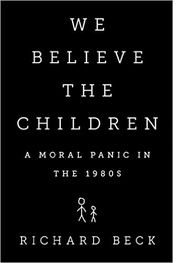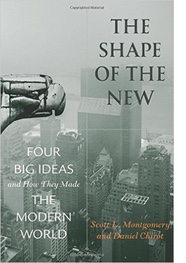NYT History Book Reviews: Who Got Noticed this Week?

Book: We Believe the Children: A Moral Panic in the 1980s
Publisher's
Summary (Via Amazon):
"During the 1980s in California, New Jersey, New York, Michigan,
Massachusetts, Florida, Tennessee, Texas, Ohio, and elsewhere, day
care workers were arrested, charged, tried, and convicted of
committing horrible sexual crimes against the children they cared
for. These crimes, social workers and prosecutors said, had gone
undetected for years, and they consisted of a brutality and sadism
that defied all imagining. The dangers of babysitting services and
day care centers became a national news media fixation. Of the many
hundreds of people who were investigated in connection with day care
and ritual abuse cases around the country, some 190 were formally
charged with crimes, leading to more than 80 convictions.
"It
would take years for people to realize what the defendants had said
all along—that these prosecutions were the product of a decade-long
outbreak of collective hysteria on par with the Salem witch trials.
Social workers and detectives employed coercive interviewing
techniques that led children to tell them what they wanted to hear.
Local and national journalists fanned the flames by promoting the
stories’ salacious aspects, while aggressive prosecutors sought to
make their careers by unearthing an unspeakable evil where parents
feared it most.
"Using extensive archival research and
drawing on dozens of interviews conducted with the hysteria’s major
figures, n+1 editor Richard Beck shows how a group of legislators,
doctors, lawyers, and parents—most working with the best of
intentions—set the stage for a cultural disaster."
Author: Richard Beck
In an interview with Publisher's Weekly, Richard was asked why he chose to focus on this particular panic. He answered: "My interest is in this period of conservative political resurgence, and its sexual politics. One narrative says that all conservatives actually care about is lowering taxes for rich people, and while they say they care about family values, abortion, and gay marriage, they don’t. They let that stuff happen. But I think conservatives have pursued a sexual politics project in a very real way. The antifeminist backlash in the ’80s was extraordinarily powerful and in many ways a success. And I think that’s part of what’s been forgotten. My interest in this panic is part of a developing interest in the cultural politics of these decades.
"The only other thing I would say, because I like to call attention to this when I can: in one sense, this particular panic has obviously ended. There are no longer new daycare workers being thrown in prison all over the place, no allegations of satanic ritual abuse flying around. However, for many of those affected, things are very much not over. Jesse Friedman [who against all evidence pleaded guilty to sexual crimes he didn’t commit in an attempt to win the judge’s sympathy] is trying to get himself exonerated because he is still classified as a Level 3 sex offender. Dan and Fran Keller [who served 21 years for child abuse based on testimony from an expert witness that a district attorney only recently called faulty] are still trying to get a finding of actual innocence. It has lingering effects that aren’t just cultural, but tangible and involve real people."
Reviewer: Mark Oppenheimer, who writes the Beliefs column for the New York Times. In 2013, he wrote a book about sex abuse in Zen Buddhism.
Review Highlights
“…his argument should prove far more enduring than all the lies and self-deceptions, so credulously believed in the 1980s, that this book does a devil of a job correcting.”
Comments: There’s nothing like a good witch hunt! Unless the witch is innocent…and…well, magic doesn’t really exist. Even if Professor McGonagall is real.

Book: Palimpsest: A History of the Written Word
Publisher's Summary (Via Amazon): "Why does writing exist? What does it mean to those who write? Born from the interplay of natural and cultural history, the seemingly magical act of writing has continually expanded our consciousness. Portrayed in mythology as either a gift from heroes or a curse from the gods, it has been used as both an instrument of power and a channel of the divine; a means of social bonding and of individual self-definition. Now, as the revolution once wrought by the printed word gives way to the digital age, many fear that the art of writing, and the nuanced thinking nurtured by writing, are under threat. But writing itself, despite striving for permanence, is always in the midst of growth and transfiguration.
"Celebrating the impulse to record, invent, and make one's mark, Matthew Battles reenchants the written word for all those susceptible to the power and beauty of writing in all of its forms."
Author: Matthew Battles, a senior researcher with metaLAB at Harvard University, where he fosters research into the critical and curatorial dimensions of technology in art and culture; advances multidisciplinary, collaborative dimensions of scholarly community; and explores innovative models for publishing.
Reviewer: David Shields, a best-selling author.
Reviewer Highlights
“Palimpsest” is a serious, well-researched book.
“…puts up a dull defense of its subject. It’s elliptically organized and full of workmanlike, hackneyed prose. It’s a history of the written word, but it’s also a repository of literary missteps.
“It isn’t clear just who Battles (the associate director of the Harvard-based research group metaLAB) intends as his audience. The book’s jargon suggests that “Palimpsest” is directed at scholars, but its ideas are an exercise in the self-evident.
“Palimpsest” might have been effective as a long, rapturous essay, but it doesn’t contain enough material to sustain a book, and perforce becomes a dumping ground, with long, potted exegeses of works by Charles Dickens, Virginia Woolf and Ha Jin, not to mention an excruciating parable by Battles himself.
“I wanted to like this book, since I care about writing not just as an activity but as a metaphor for human existence. Yet what I care most about is writing as writing. Although well intentioned, “Palimpsest” founders on its own writerly ineptitude.”
Comments: There is nothing wrong with excruciating parables if you are the leading lyricist for a death metal band. Having not read the book and having read the review, it seems that the reviewer has responded to a flight of fancy with anti-tank missiles. Pa-Pow. No offense.

Book: The Shape of the New: Four Big Ideas and How They Made the Modern World
Publisher's Summary (Via Amazon): “This panoramic book tells the story of how revolutionary ideas from the Enlightenment about freedom, equality, evolution, and democracy have reverberated through modern history and shaped the world as we know it today.
“A testament to the enduring power of ideas, The Shape of the New offers unforgettable portraits of Adam Smith, Thomas Jefferson, Alexander Hamilton, Charles Darwin, and Karl Marx--heirs of the Enlightenment who embodied its highest ideals about progress--and shows how their thoughts, over time and in the hands of their followers and opponents, transformed the very nature of our beliefs, institutions, economies, and politics. Yet these ideas also hold contradictions. They have been used in the service of brutal systems such as slavery and colonialism, been appropriated and twisted by monsters like Stalin and Hitler, and provoked reactions against the Enlightenment's legacy by Islamic Salafists and the Christian Religious Right.”
Authors: Scott L. Montgomery, an affiliate faculty member at the University of Washington, and Daniel Chirot, a professor of Russian and Eurasian studies at the University of Washington.
Reviewer: Fareed Zakaria, the anchor of CNN’s “Fareed Zakaria GPS” and the author of “In Defense of a Liberal Education.”
Reviewer Highlights
“They have to cover an immense range of material, from economics to evolution to Islamic fundamentalism. But they do so comprehensively, intelligently and with nuance and judiciousness. I was struck again and again by the extraordinary breadth, erudition and lucidity of this book.
“Their thesis is that ideas are themselves prime movers in history. But they provide a rich and balanced account that describes the permissive environment in which certain notions flourish — and others founder. They also recognize that while the thinkers they concentrate on are crucial, they are usually part of a larger group of writers, all responding to their times with similar diagnoses and prescriptions.”
Comments: The four big ideas that changed my world forever are the Montgomery GI Bill, GPS, HNN, and an enlightened sense of historical nuance. Okay, not really, but I’m trying here, and it’s the survival of the fittest in the NYT Book Reviews column! (HNN > CNN, for the record)
Image: Hans Asberger, University Pediatric Clinic, Vienna, 1940
Book: Neurotribes: The Legacy of Autism and the Future of Neurodiversity
Publisher's
Summary (Via Amazon):
“What is autism? A lifelong disability, or a naturally occurring
form of cognitive difference akin to certain forms of genius? In
truth, it is all of these things and more—and the future of our
society depends on our understanding it. WIRED
reporter Steve Silberman unearths the secret history of autism, long
suppressed by the same clinicians who became famous for discovering
it, and finds surprising answers to the crucial question of why the
number of diagnoses has soared in recent years.
“Going back
to the earliest days of autism research and chronicling the brave and
lonely journey of autistic people and their families through the
decades, Silberman provides long-sought solutions to the autism
puzzle, while mapping out a path for our society toward a more humane
world in which people with learning differences and those who love
them have access to the resources they need to live happier,
healthier, more secure, and more meaningful lives.
“Along the way, he reveals the untold story of Hans Asperger, the father of Asperger’s syndrome, whose “little professors” were targeted by the darkest social-engineering experiment in human history; exposes the covert campaign by child psychiatrist Leo Kanner to suppress knowledge of the autism spectrum for fifty years; and casts light on the growing movement of "neurodiversity" activists seeking respect, support, technological innovation, accommodations in the workplace and in education, and the right to self-determination for those with cognitive differences.”
Author: Steve Silberman
Reviewer: Jennifer Senior, the author of All Joy and No Fun: The Paradox of Modern Parenthood.
Reviewer Highlights
“...ambitious, meticulous and large-hearted (if occasionally long-winded) history.
“NeuroTribes” is beautifully told, humanizing, important. It has earned its enthusiastic foreword from Oliver Sacks; it has found its place on the shelf next to “Far From the Tree,” Andrew Solomon’s landmark appreciation of neurological differences.
“This is, without a doubt, a provocative argument that Silberman is making, one sure to draw plenty of pushback and anger. But he traces his history with scrupulous precision, and along the way he treats us to charming, pointillist portraits of historical figures who are presumed to have had Asperger’s, including Henry Cavendish and Nikola Tesla (the latter, when pressed by two elderly aunts as to which one was prettier, apparently replied that one was “not as ugly as the other”).
“His book also drags in places. Almost every character who appears in “NeuroTribes,” no matter how minor, is supplied with a back story so long it reaches a vanishing point (had 75 pages defected from my copy in the middle of the night, I’m not sure I would have missed them).”
Comments: Check out Steve Silberman’s TED Talk presentation, “The forgotten history of autism.”
For Fun: Finding Humor in Autism